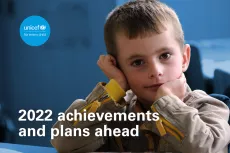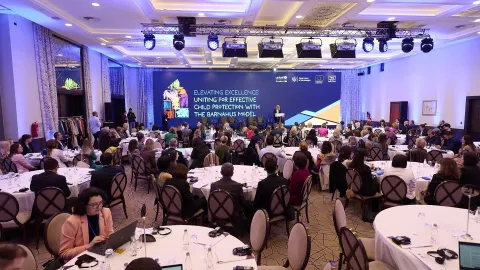2022 UNICEF achievements and plans ahead
Major contributions and drivers of results

Highlights
Montenegro is an upper-middle-income country in the Western Balkans with a moderately developed legal and institutional framework and an EU candidate country. Montenegro’s population of 617,683 is ageing and declining rapidly. In 2021, there was a historic minimum of livebirths in the country (7,033) while deaths exceeded births by almost 2,100.
Although Montenegro was perceived as a front-runner in the EU accession process in Western Balkans, the absence of constructive engagement of political parties caused the collapse of two governments in 2022, thus stalling decision-making processes and reform implementation.
Challenges remain over the effective implementation of the Convention on the Rights of the Child, primarily due to a weak accountability framework, inadequate and insufficient administrative capacities, lack of systematic monitoring and quality assurance of existing laws and strategies, and insufficient funding to ensure enforcement of children’s rights.
After a sharp recession in 2020, the economy recorded a strong rebound in 2021 and kept growing at a steady pace in the first half of 2022 as the removal of COVID-19 restrictions buoyed both domestic and external demand. Driven by surging global commodity prices, inflation increased significantly, putting additional pressure on the most vulnerable families.
Unemployment remains high, slowing the pace of poverty reduction. Job loss disproportionately affected young people and women (youth unemployment was registered at 37% according to World Bank 2021 data.2)
Post-COVID-19 effects sparked a continuing drop in demand for child health services in 2022, putting vaccination and other preventive measures at risk. Coverage for the first dose of measles, mumps and rubella fell from 90% in 2010 to 18% in 2022. Breastfeeding rates also remain low: only 24% of new-borns were breastfed within the first hour after birth and just 20% were exclusively breastfed for six months as per MICS 2018. Conservative estimates of the Situation Analysis of Early Childhood Intervention (ECI) in Montenegro show that, between 10% (3,700) and 15% (5,550) of children from 0 to 6 years require ECI services annually, but only between 31% and 46% have been identified and served. Adolescents and young people have insufficient access to mental health services while reporting an increased need for support.





